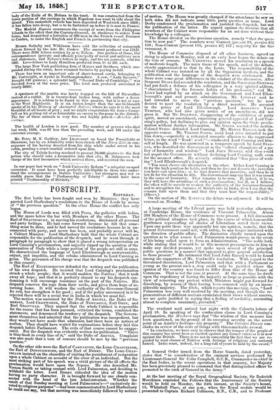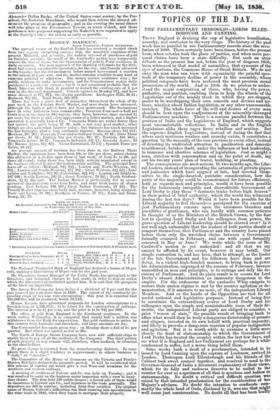POSTSCRIPT.
SATURDAY.
The first battle has been fought and won by Ministers : they have parried Lord Shaftesbury's resolutions in the House of Lords by means of " the previous question." In the other House the conflict has only begun.
The House of Lords was filled with Peers, the galleries with ladies, and the space below the bar with Members of the other House. The Earl of SHAFTESBURY, in moving his resolutions, disclaimed all personal and party feelings. He had come forward because he felt that some- thing must be done, and he had moved the resolutions because he is un- connected with party, and never has been, and probably never will be, a Cabinet Minister. Lord Shaftesbury held that the whole Cabinet are responsible for the publication of the despatch, and he went through it paragraph by paragraph to show that it placed a wrong interpretation on Lord Canning's proclamation, and unjustly ripped up the question of the annexation of Oude while a large portion of the people are still in arms. He characterized the language of Lord Ellenborough as unwarrantable, unjust, and impolitic, and the rebuke administered to Lord Canning as gross. The gravamen of his charge was that the despatch was published in this country.
The Earl of ELLEansonoren defended the writing and the publication of his own despatch. He insisted that Lord Canning's proclamation struck a whole people ; that it would madden the Natives; that it took away all hope; and that it is perfectly absurd to say his despatch con- demning it will encourage resistance on the part of the Natives. His despatch removes the rope from their necks, and gives them hope of re- turning home. It will weaken the authority of the Governor-General for evil, but strengthen it for good ; and if the policy announced in it be rejected there will be a social war in India in which we must fail.
The motion was sustained by the Duke of ARGYLL, the Duke of So- :SUET, Lord CRANWORTH, the Duke of NEweeme, Earl GREY, and Earl RANVILLE. They argued that the whole Cabinet is responsible for the course that has been pursued, criticized the terms, combated the statements, and denounced the tendency of the despatch. The Govern- talent themselves had admitted that the publication was inexpedient, but they would not have made that admission had there been no notices of motion. They should have waited for explanations before they laid this despatch before Parliament. The evils of that course cannot be exagge- rated. But the despatch was evidently written for publication. " There is blue-book in every line of it," said the Duke of ARGYLL. Complaint was also made that a vote of censure should be met by the "previous question."
On the other side were the Earl of CARNARVON, the Loan CHANCELLOR, the Earl of DONOUGHMORE, and the Earl of DERBY. The Loan CHAN- mum+. insisted on the absurdity of visiting the punishment of resignation upon a whole Cabinet on account of the error of an individual. But the most striking part of his speech was a vivid picture of the ill effects the proclamation would have upon the Sepoys. He also described Mr. Vernon Smith as taking counsel with Lord Palmerston, and deciding to withhold the letter. Lord DERBY ridiculed the idea of the motion having no party character. It is brought forward by one closely con- nected with the head of the late Administration. Whether the result of that Sunday meeting at Lord Palmerston's—" exclusively de- voted to religious purposes"—had been communicated to Lord Shaftesbury he could not arty, but that meeting was immediately followed by notices
of motion. The House was greatly changed if the attendance he saw on both sides did not indicate some little party question at issue. Lord Derby condemned the proclamation and justified the despatch, but not the publication of the latter. He argued against the doctrine that all members of the Cabinet were responsible for an act done without their knowledge by a colleague. The House divided on the previous question, namely "that the ques- tion be now put." The numbers were Content (present 93, proxies 65) 158; Non-Content (present 116, proxies 49) 167; majority for the Go- vernment, 9.
The House of Commons disposed of all other business, agreed on rising to adjourn to Monday, and at an early hour began the debate on the vote of censure. Mr. CARDWELL moved his resolution in a speech of moderate length. The main tissue of his speech, and of the debate, closely approximated to that in the Lords. The responsibility of the whole Cabinet was insisted on by all the Opposition speakers, and the publication and the language of the despatch were condemned. But there were some great differences in the conduct of the discussion. After Sergeant DEASY had seconded the resolution, and the SOLICITOR-GENERAL had put forth a defence of his colleagues in a very spirited address, " characterized by the forensic habits of his profession," and Mr. LOWE had replied by an attack on the Government and Lord Ellen- borough's past and present administration, Mr. LINDSAY said he had intended to move the " previous question," but he now desired to meet the resolution by a direct negative. lie assented to the policy of Lord Ellenborough. Lord ADOLPHUS VANE TEMPEST, who had also given notice of an amendment, did not press it. But Mr. Drttwyst, disapproving of the exhibition of party spirit, moved an amendment, expressing general approval of I.ord Can- ning's policy, but declining to give any opinion upon the Oude procla- mation without further information. Mr. GREED seconded the motion. Colonel SYKES defended Lord Canning. Mr. HENRY BAILLIE took the opposite course. Mr. VERNON SMITH, amid loud cries intended to put him down,—especially a reiterated sarcastic allusion to the suppressed letter, in the word " Read ! read !"—vindicated Lord Canning and him- self at length. He was answered in a temperate speech by Lord STAN- LEY, who described the Government as the "official champions of a po- licy of humanity and wisdom." Lord Ions; RUSSELL said they could not acquit the Government without declaring Lord Canning unfit even for the meanest office. He severely criticized that "fine piece of writ- ing" Lord Ellenborough's despatch.
"You must choose one alternative or the other. Either Lord Canning is fit for the high position he holds, and then he does not deserve the invective you have cast upon him ; or he does deserve that invective, and then he is not fit for the situation he fills. The Government may say that it was issued in the cause of humanity. That remains to be seen. If, indeed, it be so, they will have the advantage of such a proclamation ; but if, as I believe, the effect will be merely to weaken the authority of the Governor-General and to strengthen the enemies of British rule in India, then I say that the censure falls upon them and that they must bear the responsibility." (Cheers.)
On the motion of Mr. ROEBUCK the debate was adjourned. It will be resumed on Monday.
A large meeting of the Liberal party was held yesterday afternoon, at Cambridge House, the residence of Viscount Palmerston. About 200 Members of the House of Commons were present. A full discussion of the political situation took place, in the course of which honourable gentlemen representing all shades of Liberalism stated their views. Upon one point there was apparently but one opinion, namely, that the present Government could not, with safety, be any longer intrusted with the direction of public affairs. The discussion chiefly turned upon the question as to what course Lord Palmerston would pursue in the event of his being called upon to form an Administration. "The noble lord, while stating that it would be at this moment presumptuous in him to make any decided promise, yet spoke upon several of the principal public questions in a manner that appeared to give general satisfaction to those present." He intimated that Lord John Russell would be found among the supporters of Mr. Cardwell's resolution. With regard to the threatened dissolution, Lord Palmerston said that with a Parliament so young as the present such a step could only be justified where the opinion of the country was found to differ from that of the House of Commons. That is not the case at present. At the same time he dwelt upon the expediency of having the majority as large as possible with the view of removing any pretext which Ministers might put forward for dissolving, by reason of their having been censured only by an incon- siderable majority. The Globe, which reports this meeting, says, "Lord Palmerston was very well received by the meeting, and though the re- presentatives of different sections enunciated their views without reserve, we are quite justified in saying that a feeling of cordiality, amounting almost to complete unanimity, prevailed."
The overland mail arrived last night with the Calcutta letters of April 10. In speaking of the confiscation clause in Lord Canning's proclamation, the Hurkaru says that "the wisdom of this measure has been questioned, on the ground of its sweeping severity on the sorest point of an Asiatic's feelings—his property." The Calcutta Plicenix con- cludes its review of the state of things with this remarkable avowal. " In conclusion, we have only to observe that the temper of the people of this country has never been so excited against any former rulers as it is now against the British. There is no use in concealing the fact that we are re- garded by most classes of Natives with feelings of religious and national hatred. India must, indeed, for a long roll of years be held by the sword."
A General Order issued from the Horse Guards, dated yesterday, states that " in consideration of the eminent services performed by Lieutenant-General Sir Colin Campbell, G.C.B., Commander-in-chief in the East Indies, in the recent operations in that country, her Majesty has been graciously pleased to command that that distinguished officer be promoted to the rank of General in the Army."
At the last meeting of the Royal Geographical Society, Sir Roderick Murchison reminded the Fellows that the Anniversary of the Society would be held on Monday, the 24th instant, at the Society's house, 15, Whitehall Place, at one p.m., when the Royal medals would be presented to Captain Richard Collinson, R.N., C./3., and to Professor Alexander Dallas Bathe, of the United States coast survey, by the Pre- sident, Sir Roderick Murchison, who would then deliver the annual ad- dress on the progress of geography ; and in the evening the usual dinner will take place at the Freemasons' Tavern, at seven o'clock, and those gentlemen who purposed supporting Sir Roderick were requested to apply at the Society's office for tickets as early as possible.































 Previous page
Previous page